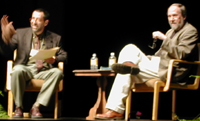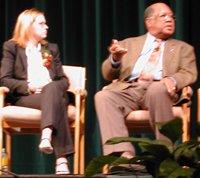
Festival of Faith & Writing 2002
The Festival of Faith and Writing is held every two years at Calvin College. Here are notes taken by Judy Alexander at the event held April 18-20, 2002.
other links:
upperroom.org
for The Upper Room daily devotional; books and magazines on Christian
spirituality
"Planting seeds inevitably changes my feelings about rain."


F

Poets Scott Cairns & Stephen Dunn
During the course of writing, I'm constantly trying to figure out what's drawing me.

Stephen Dunn, poet
- You need counterpoint, obstacles, and tension in your writing.
- Rewrite and rewrite
- Fictional detail make the writing true.
- Write what you don't know - offer the difficult, the unsayable.
- As someone once said, "There is another world, and it is in this one."
- Poetry is the clear explanation of mixed feelings
- Listen with an ear for the inner melody.
- Read bored: if something makes you alert, then it's good writing.
- Some people think that to be a poet, you just treat yourself like an artist. Such people think they can do well just because they "feel" they can. Instead, be like a violinist who knows he must practice and study. There are no short cuts.
Even in nonfiction, readers respond to stories. Readers connect with personal experiences. Readers like books that engage their senses, that are more intuitive.

Kaye Gibbons & Ernest Gaines
Kaye Gibbons, novelist
- The work is terrifying because the artist so seldom knows what she's doing.
- Do what you are spiritually moved to do.
- Language is accumulated memory.
(for devotional writing): Write honestly and redemptively. No preaching or pat answers. Don't bifurcate the things of this world and the things of God. Be quirky, entertaining, and reveal yourself. Reveal real struggles, such as being hurt by other Christians. We look for "redemptive honesty." Christians want to meet a fellow struggler who has learned something along the way.
- Always take notes.
- "Art is the moment that you are still and hear God."
- I felt that maybe I should become a minister, but I had worked so hard to be a travel writer, and I HAD to write fiction. It was even more difficult than going to seminary. With fiction writing, I could bring together ALL of my interests.
- Just keep writing to find out more about your character.
- There is wisdom in uncertainty.
- You just have to deal with the feeling all writers have, What do I know?
- Give your character a quest.
author website
click here

